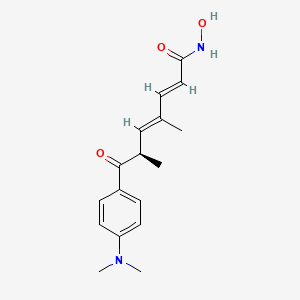trichostatin A
Trichostatin is a lipid of Polyketides (PK) class. Trichostatin is associated with abnormalities such as Dentatorubral-Pallidoluysian Atrophy, PARAGANGLIOMAS 3, abnormal fragmented structure, Disintegration (morphologic abnormality) and Hyperostosis, Diffuse Idiopathic Skeletal. The involved functions are known as Acetylation, Cell Differentiation process, histone modification, Gene Silencing and Transcriptional Activation. Trichostatin often locates in CD41a, Hematopoietic System, Chromatin Structure, Blood and Endothelium. The associated genes with Trichostatin are SPI1 gene, CELL Gene, Chromatin, CXCR4 gene and DNMT1 gene. The related lipids are Butyrates, Promega, butyrate, Lipopolysaccharides and Steroids. The related experimental models are Knock-out, Mouse Model, Xenograft Model and Cancer Model.
References related to locations published in Cancer Res.
| PMID | Journal | Published Date | Author | Title |
|---|---|---|---|---|
| 9927053 | Cancer Res. | 1999 | Saunders N et al. | Histone deacetylase inhibitors as potential anti-skin cancer agents. |
| 20332239 | Cancer Res. | 2010 | Majid S et al. | Regulation of minichromosome maintenance gene family by microRNA-1296 and genistein in prostate cancer. |
| 15781621 | Cancer Res. | 2005 | Nishigaki M et al. | Discovery of aberrant expression of R-RAS by cancer-linked DNA hypomethylation in gastric cancer using microarrays. |
| 15781649 | Cancer Res. | 2005 | Bai J et al. | Predominant Bcl-XL knockdown disables antiapoptotic mechanisms: tumor necrosis factor-related apoptosis-inducing ligand-based triple chemotherapy overcomes chemoresistance in pancreatic cancer cells in vitro. |
| 16357148 | Cancer Res. | 2005 | Noh EJ et al. | Methyl CpG-binding domain protein 3 mediates cancer-selective cytotoxicity by histone deacetylase inhibitors via differential transcriptional reprogramming in lung cancer cells. |
| 16103091 | Cancer Res. | 2005 | Blagosklonny MV et al. | Depletion of mutant p53 and cytotoxicity of histone deacetylase inhibitors. |
| 15899819 | Cancer Res. | 2005 | Ho WC et al. | Nuclear factor-kappaB induced by doxorubicin is deficient in phosphorylation and acetylation and represses nuclear factor-kappaB-dependent transcription in cancer cells. |
| 17018599 | Cancer Res. | 2006 | Zhao LY et al. | An EBF3-mediated transcriptional program that induces cell cycle arrest and apoptosis. |
